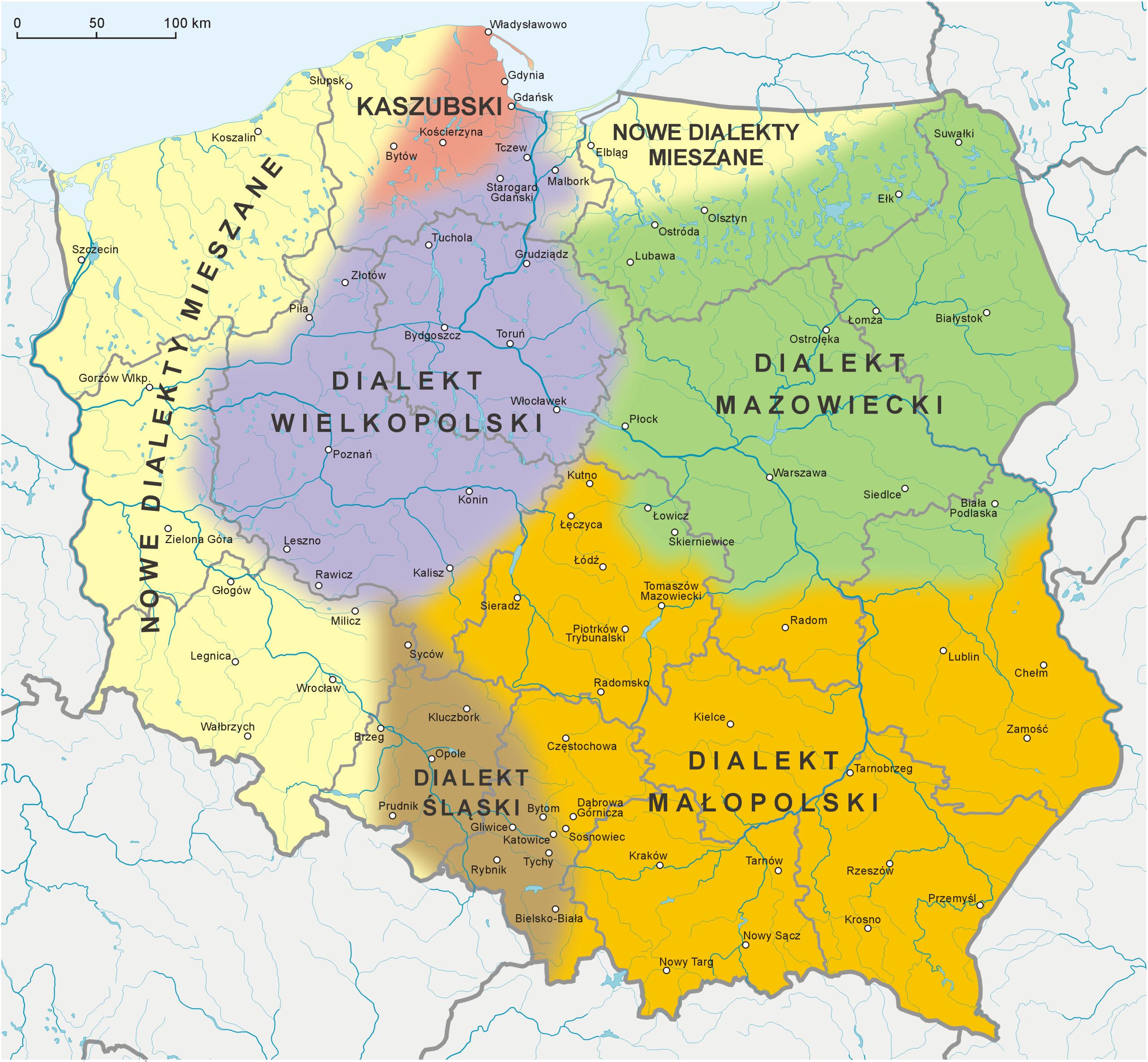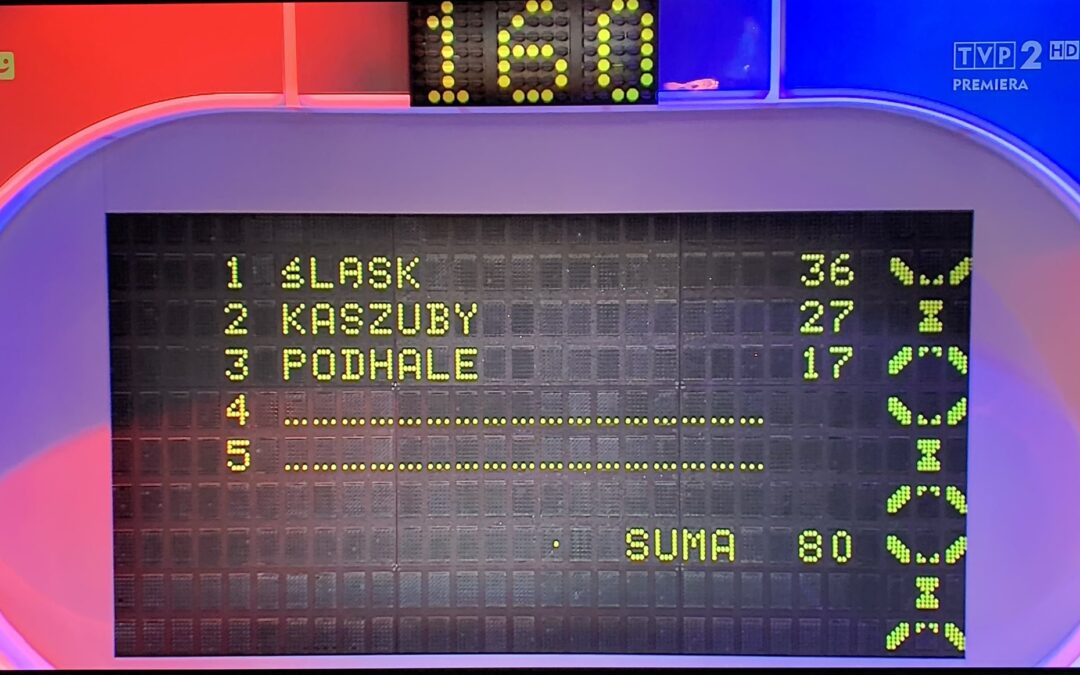A popular game show has faced complaints from one of Poland’s ethnic groups – the Kashubs – after describing their language as a dialect.
In an episode of “Familiada” (known in English as “Family Feud” or “Family Fortunes”), contestants had to guess the most popular answers in a survey question asking people to name a Polish region in which people speak in local dialect (gwara).
Kashubia – located in north-central Poland – was the second most popular answer, with 27 people out of 100 choosing it. Silesia came top, with Podhale, Greater Poland and Lesser Poland making up the remaining places respectively.

Map showing rough boundaries of dialects and languages within Poland (Aotearoa/Wikimedia Commons, under CC BY-SA 3.0)
Kashubian is, however, officially recognised as a regional language in Poland, unlike the other answers in the survey, which are regarded as dialects (though that is disputed in the case of Silesian). Over 100,000 people speak Kashubian at home, according to the 2011 census.
After the show was transmitted on state broadcaster TVP, it quickly drew criticism from Kashubian interest groups, who saw it as a slight on their culture.
“Kashubian is not a dialect, but a distinct LANGUAGE, recognised even in Polish law many years ago! Let us not perpetuate such idiocies which are harmful for its users,” wrote Kaszëbskô Jednota (the Kashubian Association) on Facebook.
Another group, Fundacja Kaszuby (Kashubia Foundation), which promotes the language, culture and tradition of the region, wrote to TVP in both Polish and Kashubian to ask it to issue a correction and inform its viewers that Kashubian is a legally recognised separate language.
Skierowaliśmy pismo do TVP, w którym prosimy o sprostowanie i poinformowanie widzów programu „Familiada”, że język kaszubski to nie jest gwara, a prawnie uznany odrębny język. Język kaszubski jest nauczany w szkołach, są w nim pisane książki i powstają programy telewizyjne. pic.twitter.com/9IXSjqRXMf
— Fundacja Kaszuby (@FundacjaKaszuby) December 20, 2020
“We realise that the programme format is based on the answers given by people taking part in surveys,” the foundation wrote.
“[But] the response ‘Kashubia’ suggests to viewers of the show that the Kashubian language is not a separate language, only a local dialect of Polish,” it continued. “The role of public television is to provide not only entertainment, but also reliable knowledge and information.”
The letter also pointed out that Kashubian is currently taught in schools to around 20,000 children, and that one of the programmes broadcast by TVP’s local branch in Gdańsk has a bilingual format.
Kashubian, like Polish, is a Lechitic West Slavic language. Much of its vocabulary is similar to Polish, although it also has strong German influences.
Lekcja 76 – 76. Ùczba
Święta – Gòdë
Gwiazdor – Gwiôzdór
prezenty – darënczi
choinka – danka
czubek – szpëc
bombki – kùgle@FundacjaKaszuby #CSB #KaszëbëRysunek: @googiemccabe pic.twitter.com/6MeeRBfg8z
— Pòlskò-kaszëbsczi słowôrz #CSB (@KaszubskieSlowa) December 24, 2020
The question of whether Kashubian is a language in its own right or a dialect of Polish has long been controversial. But in 2005 it was officially recognised as a language under the law on national and ethnic minorities and regional language.
That made Kashubian the only such recognised regional language in Poland. The government provides subsidies for the teaching of Kashubian in the region’s public schools.
Another ethnolect which, despite pressure from activists, has not received regional language status is Silesian. According to the 2011 census, it is by far the second most widely used language/dialect in Poland, with more than half a million native speakers.
Earlier this month, a Polish MEP, Łukasz Kohut, left European Parliament interpreters literally speechless when he switched to Silesian while discussing an EU initiative on minority rights in the EU.
This is great! MEP @LukaszKohut speaks in the Silesian language in the European Parliament and the simultaneous translator gets completely confused 😃 pic.twitter.com/OemJLfskqd
— Christopher Lash (@ChrisLashHist) December 15, 2020
“Don’t be afraid, Poland, of the Silesian nation and tongue,” Kohut later wrote on Twitter, mixing Silesian and Polish. “No rotten compromises on this issue – Silesian is a language, I tested that empirically in the European Parliament – the vice-president also confirmed it.”
Polish law guarantees national and ethnic minorities the right to use their own recognised languages. There are 21 officially bilingual communes where auxiliary official languages – German, Kashubian, Lithuanian and Belarusian – are used.
The law on ethnic and national minorities also permits bilingual place names for areas with minority languages.
Main image credit: TVP (screenshot)

Ben Koschalka is a translator, lecturer, and senior editor at Notes from Poland. Originally from Britain, he has lived in Kraków since 2005.




















